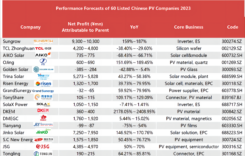By Zhengrong Shi of Suntech
While nations united to celebrate the Olympics and Paralympics in London, the world’s superpowers are competing for a dubious crown – how to outdo each other in economic nationalism in solar energy.
Recently in Europe, SolarWorld AG is seeking tariffs on China by filing an anti-dumping complaint at the European Commission. Earlier, the US Department of Commerce imposed tariffs of over 30 per cent on solar cells produced in China. In retaliation, China’s Ministry of Commerce has announced anti-dumping and countervailing investigations into exports of polysilicon from the United States and South Korea.
Enough is enough. It is time for us to embrace a global free trade zone in clean power technology – and start to break down the walls of global trade instead of putting them up.
One result of this unnecessary trade spat is that it has, in my view, reinforced the argument that free competition is critical for the development of competitive solar power.
Our industry’s mission is to make solar affordable for everyone. The problem with trade barriers is they push up the price of clean electricity, create waste and inefficiency, and make it harder for solar to compete against fossil fuels.
Just like vehicles, TVs or iPhones, solar panel costs have steadily declined because of global competition. Most people have heard of Moore’s Law for computers. The solar industry is governed by a similar phenomenon called Swanson’s Law, named after the Founder of SunPower, the US solar panel producer. Every time we double global solar panel production, the cost per watt drops by about 20 per cent. This is a one-way process. Prices really never go back up – unlike the volatility seen in fossil fuels.
In a March 2012 article, Dartmouth professor Matthew Slaughter made a compelling case for a global free trade agreement in cleantech, modelled after the Information Technology Agreement (ITA) that helped make computers affordable for billions of people. ITA is an agreement enforced by the World Trade Organization with the aim to lower all taxes and tariffs on information technology products by its signatories to zero.
He writes:
China and the U.S. should demonstrate their commitment to finding clean-energy solutions for the world by inviting all like-minded countries to quickly negotiate and implement a Clean Technology Agreement that would eliminate all international trade and investment barriers in energy industries.
This idea has resonated across the business community. In response to the tariffs, Semiconductor Equipment and Materials International (SEMI), a global industry association representing hundreds of leading semiconductor companies, agreed:
PV solar and other renewable energy industries must begin the long and difficult process of developing a comprehensive and holistic world trade agreement that promotes free and open trade and accelerates adoption of renewable energy.
The US Solar Energy Industry Association (SEIA) has taken a similar position in response to the China investigation:
We are disappointed by China’s decision to escalate the U.S.-China solar trade conflict. Unfortunately, these investigations will have an immediate, adverse impact on U.S. polysilicon manufacturers, regardless of the investigations’ outcome. The investigations also threaten the Chinese solar industry’s access to the world’s most efficient and innovative polysilicon products. Once again, what’s missing from today’s decision is any effort to find common ground. Enhanced coordination between industry and government will help avoid trade friction at an earlier stage and create a complementary avenue for resolving trade conflict.
SolarWorld, the German-headquartered company, supported by some other solar players in the industry, has successfully persuaded the US to impose trade penalties on solar panels imported from China. And now it is pressing for action in the European Union.
But, in my opinion, the vast majority of solar industry leaders want to see a trade war averted. It is imperative that the industry unites against protectionism in our fight to achieve affordable solar electricity.
In the absence of a meaningful global commitment to reducing greenhouse gases, let’s start by getting together and freeing the solar industry from the shackles of myopic protectionism. All countries should provide wide open market access and consumer-side incentives to promote the adoption of the best solar products available – no matter where it is made.
The world’s two largest producers and consumers of energy, China and the US, should lead the way on drafting and facilitating a global Sustainable Energy Trade Agreement. Now that an erroneous trade case has been filed in Europe, the European Commission must consider the impact of this case on the global PV market and recognize that a misguided trade war would undermine years of progress.
The European solar industry employs 300,000 people, and the US solar industry employs more than 100,000 people. Considering that less than 1 per cent of the world’s energy production comes from solar, imagine how many jobs we could create if that number was 25 per cent, or even 5 per cent.
To tackle global challenges such as climate change, air and water pollution, energy scarcity and energy poverty, we need global solutions unconstrained by political boundaries. Low cost solar power is a good thing for the world – we just need the courage to agree.
Dr Zhengrong Shi is founder, executive chairman and chief strategy officer for Suntech, the world’s largest producer of solar panels, with manufacturing in China, Japan, and the United States











